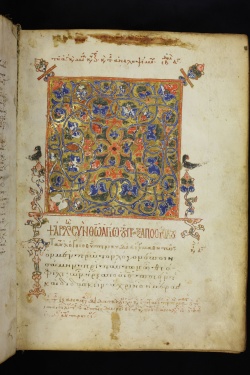Minuscule 223
From Textus Receptus
(→Further reading) |
|||
| Line 1: | Line 1: | ||
[[image:Minuscule_223_(GA)_f11r.jpg|thumb|250px|Minuscule 223]] | [[image:Minuscule_223_(GA)_f11r.jpg|thumb|250px|Minuscule 223]] | ||
| - | '''Minuscule 223''' (in the [[Biblical manuscript#Gregory-Aland|Gregory-Aland]] numbering), α263 ([[Biblical manuscript#Von Sodem|Von Soden]] numbering), is a [[Greek language|Greek]] [[Lower case|minuscule]] [[manuscript]] of the [[New Testament]], on parchment. [[Palaeography|Palaeographically]] it had been assigned to the 14th century.<sup>[ | + | '''Minuscule 223''' (in the [[Biblical manuscript#Gregory-Aland|Gregory-Aland]] numbering), α263 ([[Biblical manuscript#Von Sodem|Von Soden]] numbering),<sup>[1]</sup> is a [[Greek language|Greek]] [[Lower case|minuscule]] [[manuscript]] of the [[New Testament]], on parchment. [[Palaeography|Palaeographically]] it had been assigned to the 14th century.<sup>[2]</sup> Formerly it was labeled by 223<sup>a</sup> and 277<sup>p</sup>.<sup>[3]</sup> |
| - | [[Frederick Henry Ambrose Scrivener|Scrivener]] labeled it by 220<sup>a</sup> and 264<sup>p</sup>.<sup>[ | + | [[Frederick Henry Ambrose Scrivener|Scrivener]] labeled it by 220<sup>a</sup> and 264<sup>p</sup>.<sup>[4]</sup> |
== Description == | == Description == | ||
| - | The codex contains the text of the [[Acts of the Apostles]], [[Pauline epistles]], and [[Catholic epistles]] on 376 parchment leaves (size 28.2 cm by 21.3 cm), with some [[Lacuna (manuscript)|lacunae]] (first leaves in 2 | + | The codex contains the text of the [[Acts of the Apostles|Acts]], [[Pauline epistles|Pauline]], and [[Catholic epistles]] on 376 parchment leaves (size 28.2 cm by 21.3 cm), with some [[Lacuna (manuscript)|lacunae]] (first leaves in [[2 Corinthians]] with 2 [[Corinthians 1|1:1-3]], Ephesians with [Ephesians 1|1:1-4]][, and Hebrews with [[Hebrews 1|1:1-6]]).<sup>[2]</sup> The text is written in one column per page, 22-23 lines per page,<sup>[2]</sup> on fine vellum with broad margins.<sup>[4]</sup> Titles in gold, initial letters ornamented, brilliantly illuminated.<sup>[5]</sup> |
| + | |||
| + | The text is divided according to the κεφαλαια (''chapters''), whose numbers are given at the margin, and the τιτλοι (''titles of chapters'') at the top of the pages.<sup>[3]</sup> | ||
| + | |||
| + | It contains double prolegomena, Journeys and death of Paul, tables of κεφαλαια (''to the Acts''), lectionary markings at the margin, [[Synaxarion]], [[Menologion]], and subscriptions at the end of books.<sup>[3]</sup> The illuminations before each book | ||
== Text == | == Text == | ||
| - | The Greek text of the codex is a representative of the [[Byzantine text-type]]. [[Kurt Aland|Aland]] placed it in [[Categories of New Testament manuscripts#Category V|Category V]].<sup>[ | + | The Greek text of the codex is a representative of the [[Byzantine text-type]]. [[Kurt Aland|Aland]] placed it in [[Categories of New Testament manuscripts#Category V|Category V]].<sup>[6]</sup> |
== History == | == History == | ||
| - | The manuscript was written by Antonius, a monk.<sup>[ | + | The manuscript was written by Antonius, a monk.<sup>[3]</sup> |
| - | According to the [[Colophon (publishing)|colophon]] the manuscript was written by Antonios of Malaka in 1244. Dating of the manuscript is problematic, possibly colophon was not | + | According to the [[Colophon (publishing)|colophon]] the manuscript was written by Antonios of Malaka in [[1244 AD|1244]]. Dating of the manuscript is problematic, possibly colophon was not inserted by original scribe. It was examined by Scrivener and Gregory (1883).<sup>[3]</sup> |
It is currently housed at the [[University of Michigan Library]] (Ms. 34), at [[Ann Arbor, Michigan]].<sup>[1]</sup> | It is currently housed at the [[University of Michigan Library]] (Ms. 34), at [[Ann Arbor, Michigan]].<sup>[1]</sup> | ||
| Line 33: | Line 37: | ||
* [http://en.wikipedia.org/wiki/Minuscule_223 Wikipedia Article on Minuscule 223] | * [http://en.wikipedia.org/wiki/Minuscule_223 Wikipedia Article on Minuscule 223] | ||
| + | * [http://www.skypoint.com/members/waltzmn/Manuscripts1-500.html#m223 Minuscule 223] at the ''Encyclopedia of Textual Criticism'' | ||
| + | * [http://www.csntm.org/Manuscripts/GA223/ Images from Minuscule 223] at the ''CSNTM'' | ||
Revision as of 07:47, 24 February 2012
Minuscule 223 (in the Gregory-Aland numbering), α263 (Von Soden numbering),[1] is a Greek minuscule manuscript of the New Testament, on parchment. Palaeographically it had been assigned to the 14th century.[2] Formerly it was labeled by 223a and 277p.[3] Scrivener labeled it by 220a and 264p.[4]
Contents |
Description
The codex contains the text of the Acts, Pauline, and Catholic epistles on 376 parchment leaves (size 28.2 cm by 21.3 cm), with some lacunae (first leaves in 2 Corinthians with 2 1:1-3, Ephesians with [Ephesians 1|1:1-4]][, and Hebrews with 1:1-6).[2] The text is written in one column per page, 22-23 lines per page,[2] on fine vellum with broad margins.[4] Titles in gold, initial letters ornamented, brilliantly illuminated.[5]
The text is divided according to the κεφαλαια (chapters), whose numbers are given at the margin, and the τιτλοι (titles of chapters) at the top of the pages.[3]
It contains double prolegomena, Journeys and death of Paul, tables of κεφαλαια (to the Acts), lectionary markings at the margin, Synaxarion, Menologion, and subscriptions at the end of books.[3] The illuminations before each book
Text
The Greek text of the codex is a representative of the Byzantine text-type. Aland placed it in Category V.[6]
History
The manuscript was written by Antonius, a monk.[3] According to the colophon the manuscript was written by Antonios of Malaka in 1244. Dating of the manuscript is problematic, possibly colophon was not inserted by original scribe. It was examined by Scrivener and Gregory (1883).[3]
It is currently housed at the University of Michigan Library (Ms. 34), at Ann Arbor, Michigan.[1]
See also
Further reading
- F. H. A. Scrivener, Adversaria critica sacra (Cambridge, 1893).
- K. W. Clark, Eight American Praxapostoloi, (Chicago, 1941).
External Links
- Wikipedia Article on Minuscule 223
- Minuscule 223 at the Encyclopedia of Textual Criticism
- Images from Minuscule 223 at the CSNTM

